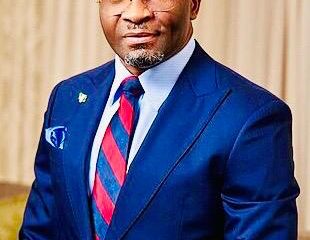OPINION
South-East Development Commission And The Benjamin Kalu Factor

By Emeka Alex Duru*
Back in the village, there was a story about a woman in a polygamous family who was hated by her husband. The disdain was so strong that at one Christmas when eating rice was reserved for the privileged, the husband, a wealthy man by the standards of the time, provided the item for the second wife while excluding her. To catch up, the alienated wife settled on Garri and boiled it as if it were rice.
Her co-wife and the entire neighbourhood mocked her because of her naivety. When her son, who was on apprenticeship p in the city, was eventually settled by his master and returned home with a bag of rice among other goodies, she burst into wild ululation, singing in typical Orlu dialect, “Ihe di woro Ogori, a gbaala n’ahia” (that which a husband denied the wife can be procured, after all).
This true-life story is typically told to inspire the oppressed and to teach that every act of cruelty has an expiration date. It serves as a warning that no matter how long the wheel of injustice and official conspiracy turns, truth, like the immortal Phoenix in Greek mythology, will rise from the ashes of death and take its proper place.
You can only appreciate the analogy above if you have followed the tortuous path that the Bill, which was recently signed into law by President Bola Tinubu and established the South East Development Commission (SEDC), has taken.
We may require a brief flashback to better understand the Commission’s arrival. Until the 1967-1970 Civil War, the South East, a subset of the larger Eastern Region, had set the pace for all aspects of national development. In terms of infrastructure, human capital development, and good governance, the zone set the standard for others. In his concise book, “The Trouble with Nigeria,” late Prof Chinua Achebe described the people as having “wiped out their handicaps in one fantastic burst of energy in the twenty years between 1930 and 1950,” despite not having an early start. The result was fantastic. By 1964, Harvard Reviews ranked the zone as the world’s fastest-growing economy.
That meteoric rate of development, however, was halted by the War, which ravaged the region, destroyed its infrastructure, wiped out the indigenous people, and left the survivors with defeat scars. At the end of the war in 1970, the Federal Government issued the principles of Reconciliation, Rehabilitation, and Rehabilitation (3Rs), which aimed to reintegrate the region into the rest of the country.
Unfortunately, none of the principles were faithfully implemented. The South East has faced significant marginalisation in terms of indigenes’ admission to Unity Schools, higher education institutions, employment in federal establishments, recruitment and advancement in the armed forces and paramilitary institutions, and infrastructure development. To say the least, the zone has been left unattended.
The region is still largely destroyed 54 years after the war. Even in national politics, the South East has received little support. Since the beginning of the current administration, the zone has not been deemed worthy of producing a president of the country.
This is the basis for understanding the South East Development Commission’s agitation. The initiative had been long awaited, having been introduced in the previous National Assembly but not approved by then-President Muhammadu Buhari. The most recent Bill that resulted in the Act was sponsored by Benjamin Kalu, Deputy Speaker of the House of Representatives, who represents Bende Federal Constituency in Abia State. And, to ensure equity and fairness, President Tinubu signed it into law on Tuesday, July 23, 2024.
The Deputy Speaker was correct when he stated that “The South East Development Commission is a healing balm from President Tinubu to the region.” Tinubu deserves to be commended for his actions. Kalu, the Bill’s arrowhead, is also worth celebrating. His colleagues from the South East and other parts of the country also contributed to the law’s implementation.
The SEDC will serve five Southeast states: Ebonyi, Imo, Abia, Enugu, and Anambra. The Commission will be responsible for receiving and managing funds from the federation account allocation for the reconstruction and rehabilitation of roads, houses, and other infrastructural damage sustained by the region as a result of the 1967-1970 civil war and other challenges.
The commission will also address ecological issues and any other environmental or developmental shortfalls in the Southeast states. SEDC’s primary goal is to provide critical infrastructural facilities such as roads, bridges, hospitals, and educational institutions. It also aims to boost economic activity in the Southeast region by addressing historical neglect and disparities.
Given the existence of similar bodies such as the North East Development Commission (NEDC) and the Niger Delta Development Commission (NDDC) in other regions of the country, it is not unreasonable to argue that the establishment of the SEDC is long overdue. Nevertheless, the President’s approval is a positive development.
It is thus appropriate to chant: “Ihe di woro Ogori, a gbaala n’ahia.” That which the region had been denied for so long has finally arrived. However, this requires more action from the Deputy Speaker, who initiated the Bill, and the President, who signed it into law. To make the SEDC operational, the necessary financial resources must be deployed. Kalu may need to do additional work to ensure that this happens. The saying that the reward for good work is more work is not without merit, particularly when it comes to serving one’s kinsmen.
He should choose from the immortal reflections of legendary Nelson Mandela, former South African President, in his great work, “Long Walk to Freedom.” Madiba wrote, “I have walked the long road to freedom.” I have tried not to falter, but I have made mistakes along the way. But I have discovered a secret: after climbing a great hill, you will find that there are many more hills to climb. I have stopped here to rest, to take in the breathtaking scenery around me, and to reflect on how far I have come. But I can only rest for a moment, because freedom brings responsibilities, and I dare not linger because my long journey is not over.”
The Deputy Speaker needs to think about these words. His work has not concluded. He still has long walks to cover. There are still many problems to be solved in the South East. He has started on a positive note. His other efforts for the region, such as the ‘Peace in the South East Project’ (PISE), which aims to use non-kinetic means to resolve insecurity in Nigeria’s South East Region, are a positive step forward.
Other leaders in the zone should join him in his noble efforts. Let the South East Development Commission be a positive turning point in the region’s history.
Duruis is the Editor, TheNiche Newspapers Lagos.
-
CRIME4 years ago
PSC Dismisses DCP Abba Kyari, To Be Prosecuted Over Alleged $1.1m Fraud
-
FEATURED4 years ago
2022 Will Brighten Possibility Of Osinbajo Presidency, Says TPP
-
FEATURED2 years ago
Buhari’s Ministers, CEOs Should Be Held Accountable Along With Emefiele, Says Timi Frank
-
BUSINESS & ECONOMY2 years ago
Oyedemi Reigns As 2023’s Real Estate Humanitarian Of The Year
-
SPORTS2 years ago
BREAKING: Jürgen Klopp Quits Liverpool As Manager At End Of Season
-
SPORTS2 years ago
Could Liverpool Afford Kylian Mbappe For €200 million? Wages, Transfer Fee
-
ENTERTAINMENT2 years ago
Veteran Nigerian Musician, Basil Akalonu Dies At 72
-
FEATURED2 years ago
Tribunal Judgement: Peter Obi Warns Of Vanishing Electoral Jurisprudence, Heads To Supreme Court
-
BUSINESS & ECONOMY2 years ago
Oyedemi Bags ‘Next Bulls Award’ As BusinessDay Celebrates Top 25 CEOs/ Business Leaders
-
FEATURED4 years ago
2023 Presidency: South East PDP Aspirants Unite, Demand Party Ticket For Zone

























